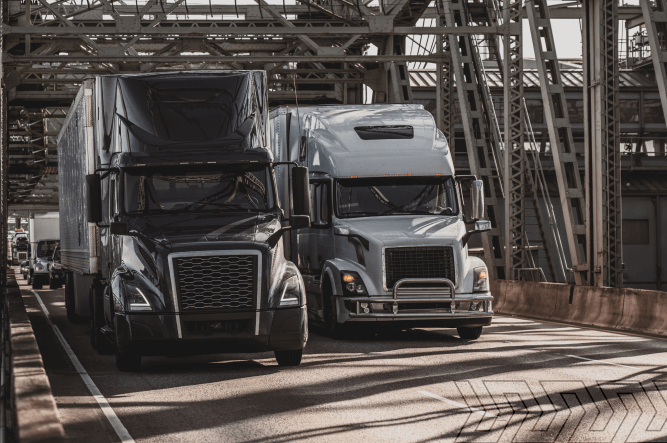What Owner Operators Need to Know About Commercial Truck Insurance

What are you waiting for?
Make more money starting now.
Commercial truck insurance is one of the first things you need to think about as an owner-operator. Not only is insurance a requirement, but it will help protect you and your business if something goes wrong.
It’s also an important step in applying for your own trucking authority. One of the first things you should do is get pre-approved for both cargo and liability insurance. Make sure you qualify for insurance, and that your rates will be affordable and reasonable enough to leave room for a profit before you spend much time on any other planning.
What owner-operators need to know about commercial truck insurance
There are several reasons you need insurance and multiple factors that affect your owner-operator insurance premiums. There are also several basics you should look for in a commercial truck insurance policy. Here’s the why, what, and how of commercial truck insurance:
Why owner-operators need truck insurance
Owner operator truck insurance is not an option. It’s a necessary business expense and a legal requirement to get your truck authority and operate your business. While insurance has to be a part of your budget, that doesn’t mean you need to overpay for insurance or carry coverage you don’t need. There are three types of required insurance:
General Commercial Liability Insurance
This type of insurance will include:
- Bodily injury and property damage liability
- Personal and advertising injury liability
- Medical payments
- Products/completed operations
- Damage to premises
General commercial liability insurance covers certain damages and protects you from being sued. For example, if a vendor jumps on a forklift to help you unload and damages a trailer, insurance should cover you. Or, what if you mistakenly use a logo belonging to another business, and that business sues? That would be covered by personal and advertising injury liability.
Standard Automotive Liability
You will also need to carry standard automotive liability to cover bodily harm or property damage in case of an accident. If you’re financing your truck or trucks, you will need collision and comprehensive coverage similar to what you carry on your car.
Cargo Insurance
You’ll also need cargo insurance to cover the items or cargo you’re hauling. The cost depends on the cargo type and whether you’re carrying intrastate or interstate. Usually, these policies have limits, so ensure you have enough coverage to carry the loads you haul.
What affects your owner-operator insurance premiums
There are two types of things that impact your owner-operator insurance premiums: things you can control and things you cannot.
Things you can’t control
Certain market forces affect every owner-operator and every motor carrier company you deal with. Even though they have a direct impact on your bottom line, these things are largely out of your control:
- “Nuclear” settlements: Major legal settlements against trucking companies in accident cases drive up everyone’s insurance premiums. Verdicts in lawsuits are rising. Although they were around $2.6 million on average in southeastern states in 2012, they rose to an average of $17 million by 2017. This forces insurance companies to raise rates to remain profitable.
- Reclassification of independent contractors: Laws like California AB-5 are changing the “employee” definition, which dictates who has to carry liability and cargo insurance and when. This has a large impact on independent contractors and owner-operators who work in the “last-mile” part of the logistics injury.
Without major reform, nuclear settlements may continue to be the norm, which will continue to drive insurance rates up. For now, there is some good news in the motor carrier realm: Courts have blocked companies from enforcing AB-5 on motor carriers operating in California. But large trucking companies are telling CA independent contractors and owner-operators they must either incorporate and get their own authority, move out of the state, or work elsewhere. This will dramatically impact the industry’s future as more states follow California’s lead with similar legislation.
Things you can control
You are in charge of your own professional actions and equipment. Stay on top of these things to protect your business:
- Safety measures and training as part of your continuing education. The safety measures you have in place and the training you provide for yourself and any drivers you might hire go a long way to lowering your insurance costs.
- Equipment and safety features. Choose your equipment carefully, keep detailed maintenance records, and opt for the best safety features whenever possible.
- Your credit score. Your personal credit score affects your insurance policies and prices. Be sure you pay all bills and debts on time.
- Your SAFER score. The FMCSA Safety and Fitness Electronic Records (SAFER) system offers company safety data to the industry and the public. Your overall score will also impact your insurance costs.
Just one at-fault accident can make your insurance premiums skyrocket and tank your SAFER score, making it hard to be profitable. Keep organized, manage your business well, and be aware of market trends and how they might affect you.

Average insurance cost for owner-operators
The average insurance cost for owner-operators varies based on whether you haul general freight or specialty items.
- General Freight: $931
- Specialty Freight: $795
If you have your own authority, it’s between $9,000-$12,000 annually per truck. Several factors go into these numbers, so this is just an average.
What to look for in insurance coverage
Before you talk to an insurance agent, know what you need and want in commercial truck insurance. It’s equally important to meet with agents who specialize in the trucking industry and owner-operator insurance needs. Here are some things to look for:
Options and all-in-one premiums
There are different kinds of coverage, from general liability to automotive liability, collision insurance on your trucks, and cargo insurance. Work with an agent who can provide all the insurance types you need in one single premium.
Know what’s required and what’s optional. Your insurance agent will likely mention optional insurance coverage or plans that are not required. They might offer special life insurance, disability insurance, or even plans from Aflac or similar companies that help pay cash and plug holes that traditional policies don’t cover. These policies have their place, but be sure you understand the difference between what is required by law, what isn’t, and what you actually need.
Premiums
Your premium is the monthly amount you will pay for insurance. Some companies offer discounts if you pay in advance at three, six, or twelve-month intervals. It’s important to understand what the premium includes, how often you will be charged and when, and what discounts you might be eligible for.
There are also some fees that insurance companies like to add to your policy, even if they don’t call them fees. Look for service charges if you pay monthly instead of in larger 90-day or six-month installments. You’ll also want to go paperless over getting statements by mail. There is often a “service charge” for paper statements.
Insurance riders offer conditional benefits with your insurance policy. These are rarely worth the money, and passing on them can save you hundreds of dollars.
Also, insurance can be deducted from your taxes as a cost of doing business. Consult with your accountant on the best timing for paying your premiums. Sometimes it’s worth paying ahead, so it’s captured in one calendar year vs. another.
Deductibles
Insurance premiums vary greatly based on the deductible. The deductible is the amount you have to pay before your insurance kicks in.
If you opt for a high-deductible policy, make sure you have the funds in your account to cover that deductible. For example, if you have a $5,000 deductible on your general liability policy, your premiums will be much lower than a comparable policy with a $1,000 deductible. But if you file a claim, you will be responsible for that first $5,000 before insurance kicks in.
In some cases, you can change your deductible. Pay careful attention to any policy change fees. But if it only costs a few dollars a month to lower your deductible, it may be worth not having to pay out of pocket for potential liabilities.
Get multiple quotes.
To get the best rates and plans, get multiple quotes. Premiums can vary a lot from company to company. But there are some basic things to remember that will affect your quote:
- Always compare policies with identical coverage. A cheaper policy often means less protection.
- Talk to the agent about claims and customer service. “Cheap” insurance may offer poor service, and it can be worth paying more to work with a company that truly has your back.
- Look at reviews online. They can reveal a lot about how a company does business, treats its customers, and responds to claims.
Choosing an insurance company is more than just about getting the lowest rates. It’s a combination of getting the best rate along with good coverage and claims response, and a company that will work with you if there is a problem. Consider them silent partners in your business.
Word of mouth is still the best source of unbiased information. Ask other drivers and owner-operators about their experience with certain companies, compare rates if they’re willing, and how they dealt with any claims and customer service issues.
Other ways to save money as an owner-operator
If you’re an owner-operator, improving profitability should always be top of mind. You can save money by reducing insurance costs, but there are other ways as well:

- Reduce deadhead miles by using a load board. An unloaded flatbed or a truck without a trailer is burning fuel and costing money if you’re driving it empty. Reduce these deadhead miles by finding backhaul loads with a load board. The Truckstop Load Board includes a special feature designed to help you do just that, so you can avoid these costly miles that eat in to your profit margins.
- Take advantage of the International Fuel Tax Agreement (IFTA), a pact between 48 states and 10 provinces in Canada and report and pay taxes for the fuel owner-operator vehicles consume across states using a single fuel tax license. This saves you time and money. It’s also helpful to know the best places to purchase fuel. The Truckstop Load Board features a tool called FuelDesk, that calculates IFTA on the go and helps you find the most fuel-efficient routes. The Trucktop Fuel card can also help you lower expenses, saving you up to $2 a gallon and up to 30% on truck maintenance.
- Know the going rates in your lane, and make it part of your booking process to negotiate for higher ones when possible. The Truckstop Load Board can help, with a rates tool that gives you accurate and timely rate estimates on loads just like yours. Using this tool, it’s likely you can negotiate a few hundred dollars more on every haul.
- Use factoring to improve cash flow and get paid faster. Factoring pays your invoice right away, so you don’t have to wait the usual 30+ days for brokers to pay you.
- Use a load board to stay busy and book the best jobs. Filter loads by rate, run similar lanes to your normal ones to reduce miles driven, build strong relationships with trusted brokers, and plan ahead toincrease backhaul revenue. The Truckstop Load Board prioritizes quality over quantity, so you never waste time on old, duplicate, or fake loads.
Listen up!
Check out our podcast, Freight Nation, where industry experts talk all things trucking.
Commercial truck insurance is a necessary business expense, but you can control those costs by knowing what you need, keeping your driving record clean, your SAFER score low, and your credit in good shape. It never hurts to shop around occasionally. Talk to your agent often about any discounts you may be eligible for.
Get helpful content delivered to your inbox.
Sign up today.
Find high-quality loads fast, get higher rates on every haul, and access tools that make your job easier at every turn.






